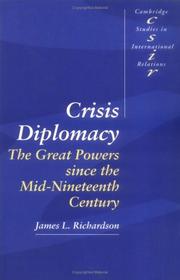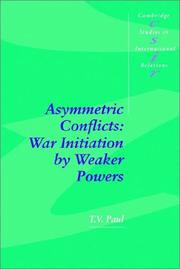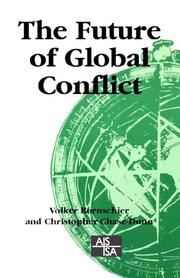| Listing 1 - 10 of 27 | << page >> |
Sort by
|
Book
ISBN: 1108110215 1108105440 0511997663 1107011957 1107676169 9780511997662 Year: 2017 Publisher: Cambridge : Cambridge University Press,
Abstract | Keywords | Export | Availability | Bookmark
 Loading...
Loading...Choose an application
- Reference Manager
- EndNote
- RefWorks (Direct export to RefWorks)
The Japanese experience of war from the late-nineteenth to the mid-twentieth century presents a stunning example of the meteoric rise and shattering fall of a great power. As Japan modernized and became the one non-European great power, its leaders concluded that an empire on the Asian mainland required the containment of Russia. Japan won the First Sino-Japanese War (1894-5) and the Russo-Japanese War (1904-5) but became overextended in the Second Sino-Japanese War (1931-45), which escalated, with profound consequences, into World War II. A combination of incomplete institution building, an increasingly lethal international environment, a skewed balance between civil and military authority, and a misunderstanding of geopolitics explains these divergent outcomes. This analytical survey examines themes including the development of Japanese institutions, diversity of opinion within the government, domestic politics, Japanese foreign policy and China's anti-Japanese responses. It is an essential guide for those interested in history, politics and international relations.
Strategy --- Great powers --- Political culture --- Imperialism --- Culture --- Political science --- Powers, Great --- Super powers --- Superpowers --- World politics --- History. --- Japan --- History, Military --- Military policy. --- Foreign relations

ISBN: 0521459877 0521453925 0511559119 Year: 1994 Volume: 35 Publisher: Cambridge : Cambridge University Press,
Abstract | Keywords | Export | Availability | Bookmark
 Loading...
Loading...Choose an application
- Reference Manager
- EndNote
- RefWorks (Direct export to RefWorks)
Although much has been written on international crises, the literature suffers from a lack of historical depth, and a proliferation of competing theoretical frameworks. Through case studies drawing on the rich historical experience of crisis diplomacy, James Richardson offers an integrated analysis based on a critical assessment of the main theoretical approaches. Due weight is given to systemic and structural factors, but also to the specific historical factors of each case, and to theories which do not presuppose rationality as well as those which do. Crisis diplomacy the major political choices made by decision makers, and their strategies, judgments and misjudgments - is found to play a crucial role in each of the case studies. This broad historical inquiry is especially timely when the ending of the Cold War has removed the settled parameters within which the superpowers conducted their crisis diplomacy.
International relations. Foreign policy --- World history --- anno 1800-1999 --- Grandes puissances --- Great powers --- Grote mogendheden --- Mogendheden [Grote ] --- Powers [Great] --- Puissances [Grandes] --- 820 Internationale Betrekkingen --- 823 Diplomatie --- 830 Economie --- 850 Vrede- en conflictstudies --- 852 Internationale conflicten --- 856.1 Conflictpreventie --- World politics --- 19th century --- 20th century --- Powers, Great --- Super powers --- Superpowers --- Social Sciences --- Political Science --- Great powers.
Book
ISBN: 9781107005419 9781107659186 9780511793967 9781139549288 1139549286 1139554247 9781139554244 0511793960 9781139551786 1139551787 1107005418 1107659183 1316089312 9781316089316 1139564102 9781139564106 1139555499 9781139555494 1283741334 9781283741330 1139550535 9781139550536 Year: 2012 Volume: 123 Publisher: Cambridge : Cambridge University Press,
Abstract | Keywords | Export | Availability | Bookmark
 Loading...
Loading...Choose an application
- Reference Manager
- EndNote
- RefWorks (Direct export to RefWorks)
Do great leaders make history? Or are they compelled to act by historical circumstance? This debate has remained unresolved since Thomas Carlyle and Karl Marx framed it in the mid-nineteenth century, yet implicit answers inform our policies and our views of history. In this book, Professor Bear F. Braumoeller argues persuasively that both perspectives are correct: leaders shape the main material and ideological forces of history that subsequently constrain and compel them. His studies of the Congress of Vienna, the interwar period, and the end of the Cold War illustrate this dynamic, and the data he marshals provide systematic evidence that leaders both shape and are constrained by the structure of the international system.
Great powers --- International relations --- Philosophy --- History --- Great powers. --- Political science --- Philosophy. --- History. --- International Relations --- General. --- Diplomatic history --- International history (Diplomatic history) --- World history --- Powers, Great --- Super powers --- Superpowers --- World politics --- Social Sciences --- Political Science --- International relations - Philosophy --- International relations - History
Book
ISBN: 9781107660113 9781139526210 1139526219 9781283574785 1283574780 9781139136808 1139136801 9781139528603 1139528602 9781107022522 1107022525 1139540203 9781139540209 1107231779 9781107231771 9786613887238 6613887234 1139532073 9781139532075 1139530887 9781139530880 113952741X 1107660114 Year: 2012 Publisher: Cambridge : Cambridge University Press,
Abstract | Keywords | Export | Availability | Bookmark
 Loading...
Loading...Choose an application
- Reference Manager
- EndNote
- RefWorks (Direct export to RefWorks)
The years between the World Wars represent an era of broken balances: the retreat of the United States from global geopolitics, the weakening of Great Britain and France, Russian isolation following the 1917 Bolshevik Revolution, the resurgence of German power in Europe, and the rise of Japan in East Asia. All these factors complicated great-power politics. This book brings together historians and political scientists to revisit the conventional wisdom on the grand strategies pursued between the World Wars, drawing on theoretical innovations and new primary sources. The contributors suggest that all the great powers pursued policies that, while in retrospect suboptimal, represented conscious, rational attempts to secure their national interests under conditions of extreme uncertainty and intense domestic and international political, economic, and strategic constraints.
Balance of power --- Great powers --- Strategic culture --- Culture --- Military policy --- National security --- Powers, Great --- Super powers --- Superpowers --- World politics --- Power, Balance of --- Power politics --- International relations --- Political realism --- History --- Social Sciences --- Political Science
Book
ISBN: 0190639962 0197558933 0190639938 0190639954 0190639946 9780197558935 9780190639938 9780190639969 9780190639952 9780190639945 Year: 2021 Publisher: New York : Oxford University Press,
Abstract | Keywords | Export | Availability | Bookmark
 Loading...
Loading...Choose an application
- Reference Manager
- EndNote
- RefWorks (Direct export to RefWorks)
"What are rising powers? Do they challenge the international order? Why do some countries but not others become rising powers? Why Nations Rise answers these questions and shows that some countries rise not just because they develop the military and economic power to do so but because they develop particular narratives about how to become a great power in the style of the great power du jour. These active rising powers accept the prevalent norms of the international order in order to become great powers. On the other hand, countries which have military and economic power but not these narratives do not rise enough to become great powers - they stay reticent powers. This book examines the narratives in historical (the United States, the Netherlands, Meiji Japan) and contemporary (Cold War Japan, post-Cold War China and India) cases to show patterns of active and reticent rising powers. It ends with lessons for how to understand two rising powers today, China and India"-- Provided by publisher.
Great powers - History. --- World politics - 19th century. --- World politics - 20th century. --- World politics - 21st century. --- International relations. Foreign policy --- Pragmatics --- Great powers. --- World politics --- Powers, Great --- Super powers --- Superpowers --- Great powers --- History.
Book
ISBN: 1529217539 1529217547 1529217520 1529217504 Year: 2021 Publisher: Bristol : Bristol University Press,
Abstract | Keywords | Export | Availability | Bookmark
 Loading...
Loading...Choose an application
- Reference Manager
- EndNote
- RefWorks (Direct export to RefWorks)
This book introduces ten key terms for analysing grand strategy and shows how the world's great powers - the United States, China, Russia and the European Union (EU) - shape their strategic decisions today and shows how the choices made will determine the course of world politics in the first half of the 21st century.
Great powers. --- World politics. --- Colonialism --- Global politics --- International politics --- Political history --- Political science --- World history --- Eastern question --- Geopolitics --- International organization --- International relations --- Powers, Great --- Super powers --- Superpowers --- World politics

ISBN: 0521466210 0521451175 0511598742 Year: 1994 Volume: 33 Publisher: Cambridge : Cambridge University Press,
Abstract | Keywords | Export | Availability | Bookmark
 Loading...
Loading...Choose an application
- Reference Manager
- EndNote
- RefWorks (Direct export to RefWorks)
This book examines a question generally neglected in the study of international relations: why does a militarily and economically less powerful state initiate conflict against a relatively strong state? T. V. Paul analyses this phenomenon by focusing on the strategic and political considerations, domestic and international, which influence a weaker state to initiate war against a more powerful adversary. The key argument of deterrence theory is that the military superiority of the status quo power, coupled with a credible retaliatory threat, will prevent attack by challengers. The author challenges this assumption by examining six twentieth-century asymmetric wars, from the Japanese offensive against Russia in 1904 to the Argentine invasion of the Falkland Islands in 1982. The book's findings have wide implications for the study of war, power, deterrence, coercive diplomacy, strategy, arms races, and alliances.
Coexistence --- Coëxistence pacifique --- Droit de la guerre --- Etats [Petits] --- Foreign affairs --- Foreign policy --- Grandes puissances --- Great powers --- Grote mogendheden --- Guerre (Droit international) --- Interdependence of nations --- International relations --- Internationale betrekkingen --- Kleine staten --- Mogendheden [Grote ] --- Nations [Small ] --- Oorlog (Internationaal recht) --- Ordre mondial --- Peaceful coexistence --- Petits états --- Powers [Great] --- Puissances [Grandes] --- Relations internationales --- Small countries --- Staten [Kleine] --- States [Small ] --- Vreedzame coëxistentie --- War (International law) --- Wereldorde --- World order --- Great powers. --- International relations. --- States, Small. --- War (International law). --- Social Sciences --- Political Science --- Foreign relations --- Global governance --- International affairs --- National security --- Sovereignty --- World politics --- Nations, Small --- Small nations --- Small states --- Political science --- States, Size of --- Middle powers --- Powers, Great --- Super powers --- Superpowers --- Hostilities --- International law --- Neutrality

ISBN: 0761958657 0761958665 9780761958659 9780761958666 Year: 1999 Volume: 49 Publisher: London: Sage,
Abstract | Keywords | Export | Availability | Bookmark
 Loading...
Loading...Choose an application
- Reference Manager
- EndNote
- RefWorks (Direct export to RefWorks)
World politics --- Great powers. --- Twenty-first century --- Forecasts. --- International relations. Foreign policy --- International economic relations --- #SBIB:003.IEB --- #SBIB:327.5H00 --- #SBIB:327.6H00 --- Strategie en vredesonderzoek: algemeen --- Internationale en diplomatieke relaties: algemeen --- Great powers --- Powers, Great --- Super powers --- Superpowers --- Forecasts
Book
ISBN: 1501730312 1501730304 1501730320 Year: 2018 Publisher: Ithaca : Cornell University Press,
Abstract | Keywords | Export | Availability | Bookmark
 Loading...
Loading...Choose an application
- Reference Manager
- EndNote
- RefWorks (Direct export to RefWorks)
"Analyzes the question of whether great powers choose to accommodate, contain, or confront a rising power depends on the legitimacy of the challenger's expansionist aims"--
Great powers --- History --- International relations --- World politics --- Middle powers --- Powers, Great --- Super powers --- Superpowers --- Middle-ranking powers --- Middle-sized powers --- Powers, Middle --- States, Size of --- States, Small --- rising powers, constructivism, power transitions, great powers, international relations, legitimacy of rising power, American hegemony, power politics, foreign relations.
Book
ISBN: 1107215501 0511853009 1282916335 9786612916335 0511931824 0511930488 0511927975 0511933177 0511933827 0511925441 9780511933172 9780521493376 0521493374 9780511925443 9780511933820 Year: 2011 Publisher: Cambridge : Cambridge University Press,
Abstract | Keywords | Export | Availability | Bookmark
 Loading...
Loading...Choose an application
- Reference Manager
- EndNote
- RefWorks (Direct export to RefWorks)
In this 2010 book, Roger Masterman examines the dividing lines between the powers of the judicial branch of government and those of the executive and legislative branches in the light of two of the most significant constitutional reforms of recent years: the Human Rights Act (1998) and Constitutional Reform Act (2005). Both statutes have implications for the separation of powers within the United Kingdom constitution. The Human Rights Act brings the judges into much closer proximity with the decisions of political actors than previously permitted by the Wednesbury standard of review and the doctrine of parliamentary sovereignty, while the Constitutional Reform Act marks the emergence of an institutionally independent judicial branch. Taken together, the two legislative schemes form the backbone of a more comprehensive system of constitutional checks and balances policed by a judicial branch underpinned by the legitimacy of institutional independence.
Judicial power --- Separation of powers --- Checks and balances (Separation of powers) --- Division of powers --- Powers, Separation of --- Constitutional law --- Political science --- Delegation of powers --- Executive power --- Judicial independence --- Judicial review --- Legislative power --- Judiciary --- Justiciability --- Power, Judicial --- Courts --- Implied powers (Constitutional law) --- Law and legislation --- Law --- General and Others --- Judicial power - Great Britain --- Separation of powers - Great Britain --- Royaume-Uni
| Listing 1 - 10 of 27 | << page >> |
Sort by
|

 Search
Search Feedback
Feedback About
About Help
Help News
News